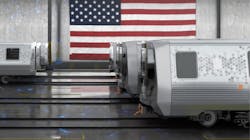Hitachi Rail announces location for new $70M factory to build railcars for the Washington metro region
Washington County, Md., will be the location of Hitachi Rail's state-of-the-art $70 million factory that will build the new fleet of 8000-series railcars for the Washington Metropolitan Area Transit Authority (WMATA).
In a major expansion of Hitachi Rail’s presence in the U.S., the new site will manufacture modern railcars for the Washington D.C. region and will have the capacity to serve the wider North American railway market.
“I’m delighted to confirm the location of our new state-of-the-art U.S. train factory in Washington County. From here, our 460 strong American workforce will build a fleet of modern metro trains and have the capability to build trains for towns and cities across North America," said Andrew Barr, Group CEO, Hitachi Rail. “Hitachi Rail’s mission is to provide more seamless, sustainable journeys for passengers, customers and cities, and the creation of a new American train factory reflects our ambition to deliver for the United States.”
Hitachi Rail has taken the strategic decision to make its new facility a central manufacturing hub for its Americas business. The factory will develop a skilled new workforce, create a broad local supply chain and bring extensive economic value to the region.
The site in Washington County is well located to serve the Washington metro area – and is 90 minutes from WMATA’s Greenbelt Rail Yard, where the completed trains will be delivered. An important advantage of the location is that the Greater Hagerstown region is a major center for logistics and has excellent connections to the Northeastern United States and beyond.
Having acquired the plot, near the growing Hopewell Valley industrial park, the next stage will involve preparing the land for construction. Once the process of grading the land is finished in the fall, the construction of the factory will begin in earnest, with the site scheduled to be operational in winter 2023/24.
“Having a global company like Hitachi Rail select Hagerstown as the site of a major U.S. expansion is outstanding news for Washington County and the entire state of Maryland," said Maryland Gov. Larry Hogan. “With this new facility, Hitachi Rail will be creating hundreds of critical manufacturing jobs in our state with the capability to serve the wider North American market. We are excited to work with the company on this transformative project and look forward to its continued success in Maryland.”
A state-of-the-art American train factory
The factory building will cover 307,000-square feet – an area equivalent to the size of more than five football fields – and includes a large production area, warehouse and main office. The manufacturing facilities will be built on a 41-acre plot, which will also be equipped with an 800-yard test track allowing dynamic testing of trains on site.
When fully operational, the factory will be able to produce up to 20 railcars per month on a single shift and have the capability to build trains of all different types, from trams and metros to high speed trains.
The factory will benefit from Hitachi Rail’s American and global manufacturing expertise, taking the best practices from its existing locations in Miami, Fla., as well as facilities in Japan, Italy and the UK. It will also draw from the Hitachi Group’s leadership in digital technology to ensure that production, testing and the management of supplies can be optimized. These initiatives, combined with the high-quality training program for employees, will allow the facility to produce trains to the highest standards of reliability and performance.
Economic benefits for the wider region
The new factory will sustain a total of 1,300 jobs, of which 460 employees will work for Hitachi Rail at the site. These 1,300 jobs – direct, indirect and induced – will command total earnings of $350 million per year, which will bring major economic benefits to D.C., Maryland, and Virginia.
The construction and operation of the factory will be a major boost for the regional economy. Around 60 percent of the construction value of the factory is expected to be spent with suppliers from across the region, which equates to more than $40 million. Small businesses are expected to benefit too, with more than a quarter (27 percent) of the total expenditure anticipated to go to Small Business Enterprises (SBEs).
Modern, high quality railcars for WMATA
The factory’s first order will be to deliver the 8000-series fleet for WMATA as part of an up to $2.2 billion contract that was announced in March 2021. The base order of 256 new railcars – with additional options of up to 800 in the fleet – will increase reliability, offer modern on-board technology and an improved passenger experience. The WMATA trains will have popular features and enhanced security that include:
- Digital screens, improved journey information and on-board Wi-Fi
- Smart doors that respond individually to obstructions
- High-definition security cameras
- Ventilation system improvements
- Stringent cybersecurity requirements
- More space between seats, wider aisles
- Heated floors throughout
- Improved regenerative braking
The all-electric vehicles, with 130 seats per pair of cars, will be a major upgrade when they replace the 2000- and 3000-series fleets, which have been in service since the early 1980s. For WMATA, the new fleet will help improve the service for passengers, be easier to maintain and reduce costs.
The new 8000-series will help meet the Washington, D.C., region’s sustainability goals by encouraging more people out of cars and on to the electric-powered Metro trains – thereby reducing congestion, pollution and carbon emissions. The trains themselves will be quieter and more energy efficient than the older fleets they will replace.
“It’s important that this investment in rail cars will enable us to replace our legacy equipment, while accruing economic benefits to the region through jobs, use of local suppliers and work for small and minority-owned businesses,” said WMATA General Manager Paul Wiedefeld.
